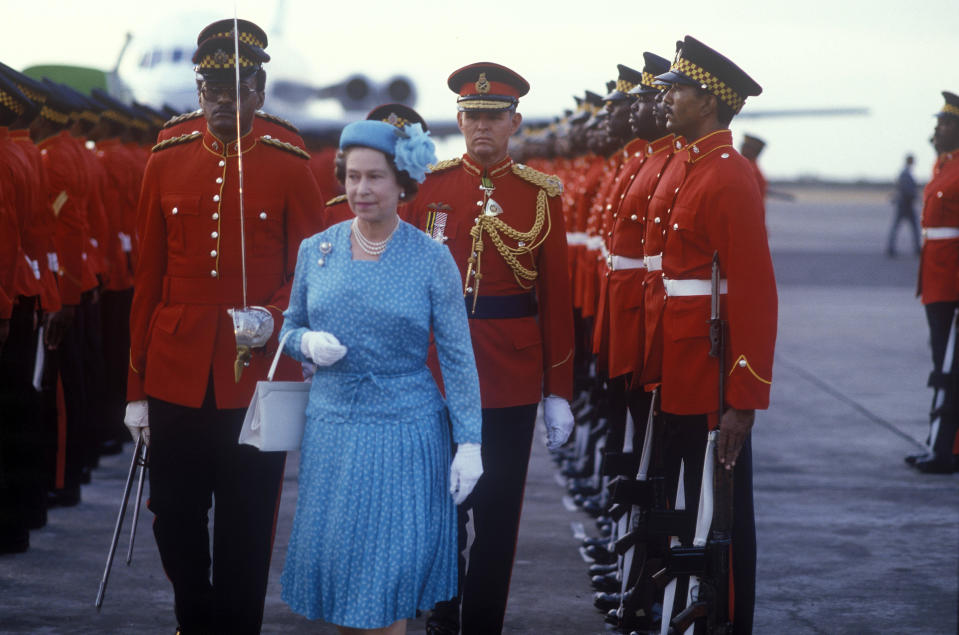Will Barbados removing the Queen as head of state trigger other countries to do the same?
More than 50 years after becoming an independent nation, Barbados is set to remove the Queen as its head of state.
Other than the UK, there are 15 countries where the Queen is head of state, known as commonwealth realms. From next year that number will be down to 14.
Barbados isn’t the first Caribbean island to remove the Queen as head of state. In 1970, Guyana took the step. Then in 1976, Trinidad and Tobago followed suit and in 1978, Dominica did the same.
The question now is whether Barbados’ decision will trigger another chain reaction in the remaining realms.
Melissa Murray, professor of law at New York University, told Yahoo UK that she believes: “it will likely spur other Commonwealth realms to reconsider whether they wish to retain the Queen as head of state”.
“The Jamaican government has indicated that becoming a republic is a priority, so perhaps this move from Barbados will prompt action on this front elsewhere in the Caribbean,” she added.

Jamaica’s politicians have been talking about removing the Queen for some time, but the nation’s complicated constitution has stopped it happening so far.
According to University College London (UCL): “In Jamaica successive prime ministers have long advocated that Jamaica should become a republic, and several have committed to achieving that. Both major parties want Jamaica to become a republic.
“The difficulty lies in the Jamaican constitution, which has very high thresholds for constitutional change: two thirds majorities in the House of Representatives and the Senate, and any change to the monarchy must also be submitted to referendum.”
Back in 2012, Brian Meeks, who was then a professor of social and political change at the University of the West Indies in Mona, Jamaica, told Time Magazine: “The Queen’s our head of state, but we still need a visa to visit her and that’s one of the many underlying incongruities pushing us toward a republic.
“Britain also occupies a different place in the mind for countries like Jamaica, where slavery was part of colonialism, than it does for countries like Canada or Australia.”

In 2003 and 2010, Jamaica’s respective leaders, PJ Patterson and Bruce Golding, both spoke about replacing the Queen as head of state with a ‘home-grown’ president.
And in 2012, just hours after saying she would hold a referendum on the Queen being head of state, then prime minister Portia Simpson Miller was pictured hugging Prince Harry during his royal visit to the island, revealing the complicated nature of the island’s relationship with the crown.
St Vincent and the Grenadines rejected the idea of removing the Queen as head of state in a 2009 referendum.
Away from the Caribbean, Australia has a history of republican sentiment, though a referendum held in 1999 to remove the Queen as head of state was lost by the republicans, at 55% to 45%.
UCL explained that when Malcolm Turnbull was prime minister: “In 2016 [Turnbull] said the issue would be raised again after the Queen's death; but republicans would need first to decide whether the new head of state should be directly elected by the people, or selected by Parliament (divisions on this issue led to defeat in the 1999 referendum).”
Sandy Biar, national director of the Australian Republic Movement, thinks his cause is “gaining momentum”.
“As the governor-general of Barbados Dame Sandra Mason said: ‘This is the ultimate statement of confidence in who we are and what we are capable of achieving' and the same could be said for Australia,” he told Yahoo UK.
“It’s time we had our independence from the British Monarchy too. The head of Australia should be someone who puts the Australian people and our national interests first. It’s what every self-respecting and independent nation deserves to have.
“In recent years the push towards Australia having a head of state that represents Australians and is chosen by Australians has been gaining momentum. There are now more people engaged in the campaign than at any time since the last referendum, and opinion polls are showing overwhelmingly that Australians want this change to happen.”

In July 2020, a YouGov poll of 4,500 Australians found 62% wanted an Australian head of state.
Of that poll, Australian Republic Movement (ARM) chairman Peter FitzSimons said: “Since I have been involved with the ARM, which goes back two decades now, the traditional magic number has been 60% - as in the politicians have said to us, ‘Get it over 60% and you will have a strong enough backing that we might back you’.”
But the Australian Monarchist League (AML) criticised the poll as “warped” and said in a statement: “The inference in the question was that we are somehow a vassal of the United Kingdom, which we are most definitely not. We find that the emphasis in the question is misleading and would corrupt any response.”
The statement continued: “The plain fact is that our system of constitutional monarchy works because we have checks and balances which cannot be replicated in any republic where most are totally controlled by politicians and big-business. Therefore, becoming a republic would be a retrograde step for Australia.”
A poll commissioned by the Jamaica Observer in August found that 55% of Jamaicans thought the Queen should be removed as head of state.
While that may not seem like overwhelming support for her removal, only 30% said she should continue in the role.
There have not been any immediate copycat announcements by the remaining Commonwealth realms, which include Antigua and Barbuda, Tuvalu and Canada.

 Yahoo Finance
Yahoo Finance 